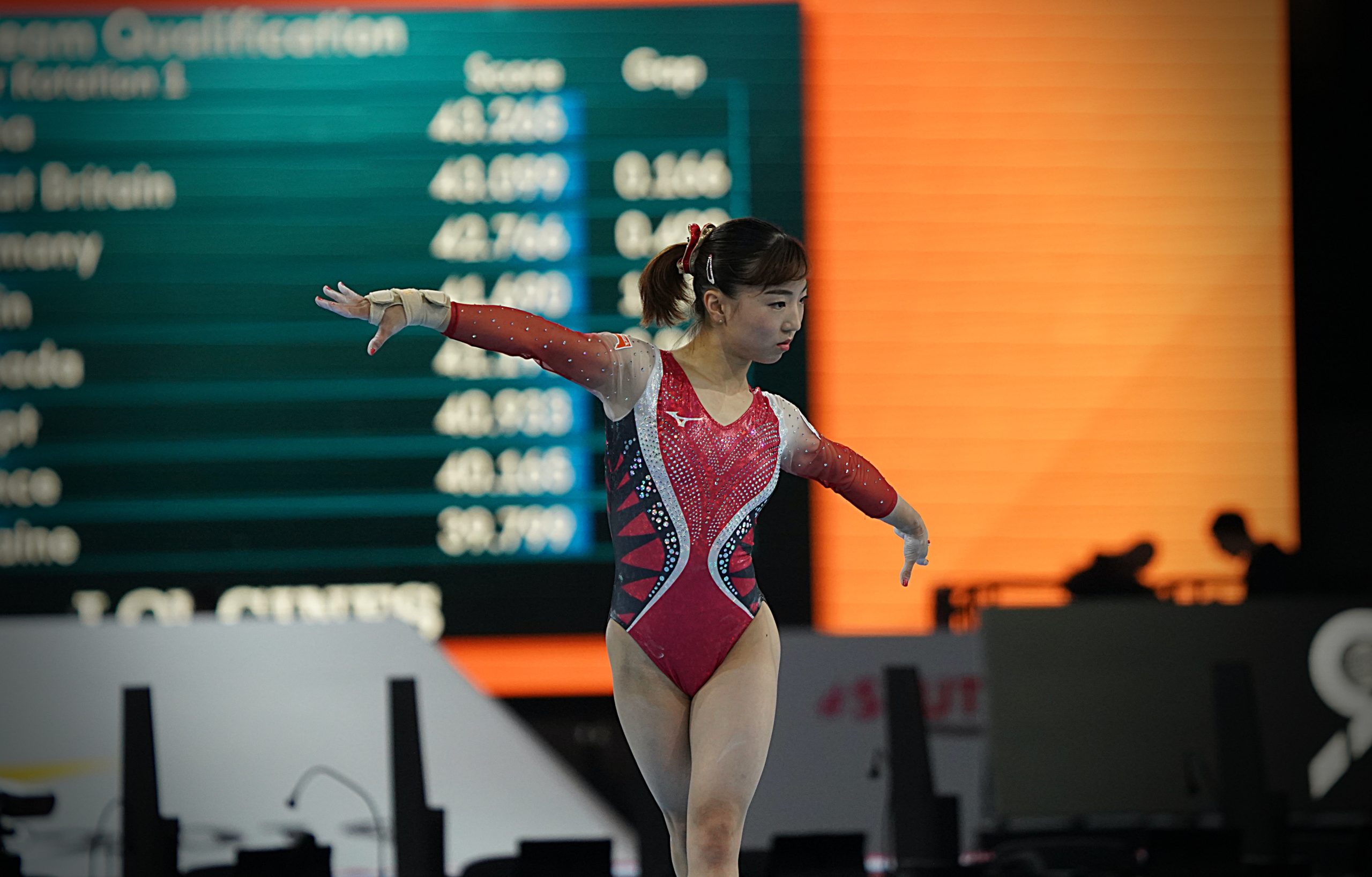Asuka Teramoto tore her Achilles in the beginning of the year and at that point, it seemed to many that her dream of competing at the Olympics in front of the home crowd was over. Especially since Japan is notorious for selecting their teams many months before big events – this was how Mai Murakami missed the 2019 World Championships. However, Teramoto was committed to training even when she thought it was still a long shot. Then, the Olympics were postponed for a year, giving her plenty of time for recovery. Teramoto talked to the media about the injury, recovery, and her current mental state.
Translated from Japanese by Jenn
Q: How are you right now?
A: I’m feeling quite good. I’m gradually able to do more and more, and although I get tired easier right now, I’m getting through it. I’m actually able to work out without any restrictions. But I was doing nothing for several months, so the process is to start with rehab, then after making sure my Achilles works right again, practicing on trampoline and moving on to skills I feel I can do.
Q: What was your state of mind when you got injured?
A: I thought it was all over. The second I got hurt I thought I would have to give up on Tokyo. I remember it clearly, it was like my head hurt. My Achilles itself didn’t hurt, but I could feel something very bad happened in my body. Then I realized it had torn and it was like that was equivalent to my career being over. I couldn’t even cry. I thought I had to quit or I wouldn’t be able to handle it. The first thing that went through my mind when I got hurt was, “What should I do now?”
Q: Once you decided to keep going after the surgery, what kind of reaction did you get?
A: It was the day after the surgery. The national team camp was over and Mai Murakami came to see me and brought a board signed by everyone. It said things like “You’ll get through this” and “We’re waiting for you.” I was so moved that my heart hurt.
Q: What changed in your state of mind from when you wanted to quit?
A: The first person I called was the coach. Then I called one of my younger teammates from college who is with Legyc [club] now. I told her I was trying to decide whether to keep doing gymnastics or not. She said, “If you quit now, the five months between now and the Olympics will be hell.” She also said that she knew I would definitely regret it. She was saying that if I kept training, even if I didn’t qualify, I would feel like I did what I could. I thought about it and it was truly how I felt. It would be better to do it than to regret not doing it. In the end, after the surgery was over and things settled down, I went to coach Okazaki. She hadn’t given up at all and was calculating backward, saying if I could do this by this time and if I could do beam skills then I could qualify by event and this and that and that I still had a chance. It was decided right then. I was leaning toward quitting, but my coach and college teammate pushed me back to leaning toward continuing. The doctor said this was the only path to take.
Q: After that the Olympics were postponed.
A: It’s hard because I know that there are athletes who were disappointed, but for me that was a time when I was overextending myself with a torn Achilles tendon. If I really overdid it I might tear it again. I was afraid of that so [when I heard of the postponement] I thought I would be able to take my time and heal properly.
Q: What did you gain from your injury?
A: My mental state. It was a trial for me, the most tiring wall that I couldn’t climb over in my entire career. I think if I’m able to get through this, I will truly become strong as a person.
Q: You’ve said you “want to give a performance that conveys life”. Are you doing that this season?
A: A lot has happened this past year. Not just me; a lot of people have been struggling, and I think the Tokyo Olympics will have an entirely different sense of emotion. I have spent the past year having the goal of giving a performance that tells about life, but I think I can say more. I want that to be the goal in my performance.
Q: What are your upcoming competition dates?
A: The Japan senior national competition is in September. There is no reason to overextend myself for it, but I want to see where I’m at. I want to compete all events except vault. I think the December national competition will be somewhat of a qualifier and I’ll need to show how much I’ve progressed, so I hope to be back in shape by December.
Q: What is the appeal of the Olympics?
A: I think it’s the unity in all sports. The World Championships is only gymnastics, but there are other sports in the Olympics. That really gives you power. In London it was all too new to me, but in Rio we were with the rhythmic gymnasts, even though we had different schedules. There are also unified ceremonies and it’s really exciting to see and talk to athletes from other sports.
Q: Are you worried they Games might be canceled altogether?
A. Even if they don’t happen, there are things I can share and there are things I can do. I’m sure there are associations doing trial and error with the coronavirus and I think gymnastics has to learn from them. I don’t think the Olympics are everything.



